Faculty Books
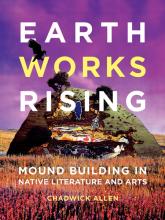
Typically represented as unsolved mysteries or ruins of a tragic past, Indigenous mounds have long been marginalized and misunderstood. In Earthworks Rising, Chadwick Allen issues a compelling corrective, revealing a countertradition based in Indigenous worldviews. Alongside twentieth- and twenty-first-century Native writers, artists, and intellectuals, Allen rebuts colonial discourses and examines the multiple ways these remarkable structures continue to hold ancient knowledge and make new meaning—in the present and for the future.
Earthworks Rising is organized to align with key functional categories for mounds (effigies, platforms, and burials) and with key concepts within mound-building cultures. From the Great Serpent Mound in Ohio to the mound metropolis Cahokia in Illinois to the generative Mother Mound in Mississippi, Allen takes readers deep into some of the most renowned earthworks. He draws on the insights of poets Allison Hedge Coke and Margaret Noodin, novelists LeAnne Howe and Phillip Carroll Morgan, and artists Monique Mojica and Alyssa Hinton, weaving in a personal history of earthwork encounters and productive conversation with fellow researchers.
Spanning literature, art, performance, and built environments, Earthworks Rising engages Indigenous mounds as forms of "land-writing" and as conduits for connections across worlds and generations. Clear and compelling, it provokes greater understanding of the remarkable accomplishments of North America's diverse mound-building cultures over thousands of years and brings attention to new earthworks rising in the twenty-first century.

In Toward an Anti-Capitalist Composition, James Rushing Daniel argues that capitalism is eminently responsible for the entangled catastrophes of the twenty-first century—precarity, economic and racial inequality, the decline of democratic culture, and climate change—and that it must accordingly become a central focus in the teaching of writing. Delving into pedagogy, research, and institutional work, he calls for an ambitious reimagining of composition as a discipline opposed to capitalism’s excesses.
Drawing on an array of philosophers, political theorists, and activists, Daniel outlines an anti-capitalist approach informed by the common, a concept theorized by Pierre Dardot and Christian Laval as a solidaristic response to capitalism rooted in inventive political action. Rather than relying upon claims of membership or ownership, the common supports radical, collective acts of remaking that comprehensively reject capitalist logics. Applying this approach to collaborative writing, student debt, working culture, and digital writing, Daniel demonstrates how the writing classroom may be oriented toward capitalist harms and prepares students to critique and resist them. He likewise employs the common to theorize how anti-capitalist interventions beyond the classroom could challenge institutional privatization and oppose the adjunctification of the professoriate. Arguing that composition scholars have long neglected marketization and corporate power, Toward an Anti-Capitalist Composition extends a case for adopting a resolute anti-capitalist stance in the field and for remaking the university as a site of common work.
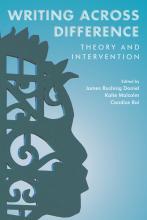
[The collection includes contributions from current and former members of the UW English Department, including Anis Bawarshi, Megan Callow, Juan C. Guerra, Stephanie Kerschbaum, Ann Shivers-McNair, and Sumyat Thu.]
As the nation becomes increasingly divided by economic inequality, racial injustice, xenophobic violence, and authoritarian governance, scholars in writing studies have strived to develop responsive theories and practices to engage students, teachers, administrators, and citizens in the crisis of division and to begin the complicated work of radically transforming our inequitable institutions and society. Writing across Difference is one of the first collections to gather scholars from across the field engaged in offering theoretical, methodological, and pedagogical resources for understanding, interrogating, negotiating, and writing across difference.
Writing across Difference offers writing scholars a sustained intellectual encounter with the crisis of difference and foregrounds the possibilities such an encounter offers for collective action toward a more inclusive and equitable society. It presents a variety of approaches for intervening in classrooms and institutions in the interest of focalizing, understanding, negotiating, and bridging difference. The book will be a valuable resource to those disturbed by the bigotry, violence, and fanaticism that mark our political culture and who are seeking inspiration, models, and methods for collective response.
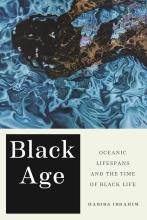
Although more than fifty years apart, the murders of Emmett Till and Trayvon Martin share a commonality: Black children are not seen as children. Time and time again, excuses for police brutality and aggression—particularly against Black children— concern the victim “appearing” as a threat. But why and how is the perceived “appearance” of Black persons so completely separated from common perceptions of age and time?
Black Age: Oceanic Lifespans and the Time of Black Life posits age, life stages, and lifespans as a central lens through which to view Blackness, particularly with regard to the history of transatlantic slavery. Focusing on Black literary culture of the late twentieth and early twenty-first centuries, Habiba Ibrahim examines how the history of transatlantic slavery and the constitution of modern Blackness has been reimagined through the embodiment of age. She argues that Black age—through nearly four centuries of subjugation— has become contingent, malleable, and suited for the needs of enslavement. As a result, rather than the number of years lived or a developmental life stage, Black age came to signify exchange value, historical under-development, timelessness, and other fantasies borne out of Black exclusion from the human.
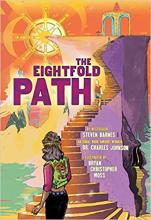
Eight strangers looking for enlightenment from an ancient spiritual teacher are trapped in a cave high in the mountains on their way to his temple. One of his acolytes directs them to each tell a story that the group can learn from as they wait out the horrible snowstorm that rages outside the cave’s entrance.
One by one the travelers each share a story that, unbeknownst to them, is actually a morality tale representing one of the aspects of final enlightenment as taught in Buddhism. As the wind howls through the night, they tell symbolic stories of horror, dystopia, high adventure, cyberpunk, and urban fantasy. Each story is a spoke on the symbolic Dharma wheel, and each interlocking tale gets the travelers closer to their true destiny—unveiling the future of the entire human race.
This remarkable collection borrows heavily from the traditions of pop-culture morality anthology series such as The Twilight Zone, The Outer Limits, Night Gallery, Lovecraft Country, and the publications of E.C. Comics. Heavily influenced by the science fiction pulps of the 1950s and 1960s, this brilliant collection remixes classic social narratives such as Plato’s Allegory of the Cave, Chaucer’s The Canterbury Tales, and The Arabian Nights, through an edgy, contemporary, yet spiritually centered lens. In The Eightfold Path, our destinies lie in heeding the lessons given in every one of these entrancing tales.
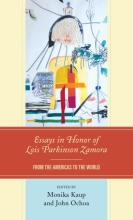
.
Honoring the lifework of the comparative literature scholar, Essays in Honor of Lois Parkinson Zamora: From the Americas to the World traces artistic and cultural pathways that connect Latin American literature and culture to the Americas, and to the world beyond. The essays in this collection cover three critical fields: comparative hemispheric American literature, magical realism, and the Baroque/New World Baroque/Neobaroque. Beginning with a critical reassessment of hemispheric American studies, these essays analyze the works of a wide array of writers, such as Roberto Bolaño, Alejo Carpentier, Gabriel García Márquez, Waldo Frank, and José Lez. These chapters build upon the legacy of the scholarship done by Dr. Zamora and exemplify the pattern of literary studies that she has driven forward.
David Shields, Tiffany Louquet, and Elizabeth Searle wrote the screenplay for the feature film I’ll Show You Mine, directed by Megan Griffiths.
An author who has made her career by examining her own trauma interviews her nephew about his history of exploitation as a gender-nonconforming model and pansexual poster boy. But to get to the most hidden parts of his story, she must reciprocate by digging into areas she has scrupulously managed to avoid in her own.

David Shields decided to gather every interview he’s ever given, going back nearly forty years. If it was on the radio or TV or a podcast, he transcribed it. He wasn’t sure what he was looking for, but he knew he wasn’t interested in any of his own answers. The questions interested him—approximately 2,700, which he condensed and collated to form twenty-two chapters focused on such subjects as Process, Childhood, Failure, Capitalism, Suicide, and Comedy. Then, according to Shields, “the real work began: rewriting and editing and remixing the questions and finding a through-line.”
The result is a lacerating self-demolition in which the author—in this case, a late-middle-aged white man—is strangely, thrillingly absent. As Chuck Klosterman says, “The Very Last Interview is David Shields doing what he has done dazzlingly for the past twenty-five years: interrogating his own intellectual experience by changing the meaning of what seems both obviously straightforward and obviously wrong.” The Very Last Interview has been adapted by Rachel Kempf and Nick Toti into a film of the same name.
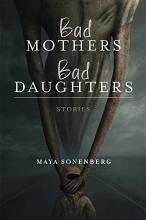
What happens when the urge to ditch your family outpaces the desire to love them? The stories in Bad Mothers, Bad Daughters, winner of the Richard Sullivan Prize in Short Fiction, attempt to answer this question, heading straight for the messiness of domestic relationships and the constraints society places on women as they navigate their obligations. Daughters desert their rheumy-eyed elders in dusty museums, steal a mother's favorite teacup, or consider throwing their dead parents' nostalgia-riddled belongings out the window. Mothers conclude that they love one child more than their others. Fathers puzzle over a wife's inability to balance family and career or accuse a partner of blaming their child for her own misdeeds. Women mourn the children they decided not to have and fret over the legacy they'll leave the children they do have. But sometimes the generations reconcile or siblings manage to rescue each other. Love tears these people apart, but it mends them too.
The emotions expressed in these stories are combustible, both fraught and nuanced, uncontrollable and common, but above all often ignored or hushed because we're not supposed to be bored by our children or annoyed with our aged parents, even as we love them. The careful shapes of these stories adapted from fairy tales, verse, letters, or newspaper announcements, the surprise of their wordplay, and the blaze of their lyrical sentences allow them to dig into and contain all those messy emotions at the same time. In these works, constraint creates both understanding and fire.